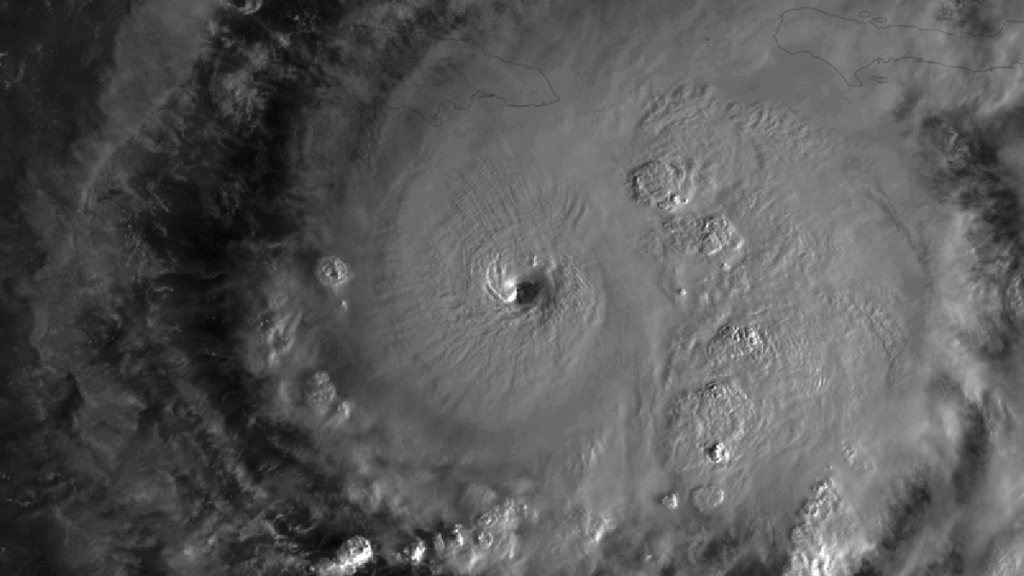October 27, 2025
2 min read
With Melissa, 2025 Becomes Only the Second Season with More Than Two Category 5 Hurricanes
This is only the second time we’ve had more than two Category 5 storms in a single Atlantic hurricane season
Hurricane Melissa swirls in the Caribbean Sea, as seen by the GOES-19 weather satellite operated by the National Oceanic and Atmospheric Administration.
Cooperative Institute for Research in the Atmosphere, Colorado State University/National Oceanic and Atmospheric Administration
As it bears down on Jamaica, Hurricane Melissa has become the third Category 5 storm of the 2025 Atlantic season—just the second season on record to ever see more than two Category 5 hurricanes.
The only other Atlantic season to achieve this feat was the blockbuster one of 2005, which featured four Category 5 storms: Emily, Katrina, Rita and Wilma.
Hurricanes are categorized on the Saffir-Simpson scale based on their wind speeds: a storm becomes a Category 1 when its winds reach 74 miles per hour and a Category 5 when they reach 157 mph.
On supporting science journalism
If you’re enjoying this article, consider supporting our award-winning journalism by subscribing. By purchasing a subscription you are helping to ensure the future of impactful stories about the discoveries and ideas shaping our world today.
Category 5 storms are rare—Melissa is only the 45th Category 5 in the Atlantic Ocean on record since 1851. These storms require a perfect alignment of prodigious available energy and conducive atmospheric conditions to reach and sustain such powerful wind speeds.
READ MORE: Hurricane Science Has a Lot of Jargon—Here’s What It All Means
Melissa was able to reach its 165-mph maximum wind speed by taking advantage of exceptionally warm waters in the Caribbean Sea. It underwent extreme rapid intensification, strengthening from a 70-mph tropical storm last Saturday morning to a 140-mph Category 4 hurricane on Sunday—twice the rate of the official threshold of rapid intensification. (The storm strengthened further later on Sunday and again on Monday.) That level of strengthening “is on the fringes of what’s ever been observed in the Atlantic basin,” wrote meteorologist Michael Lowry on his blog.
With rising ocean temperatures, more storms are expected to undergo such rapid intensification and to intensify at faster rates. In a changing climate, hurricanes are also becoming stronger overall—one study found that climate change amplified the winds of every hurricane in 2024. That trend means more storms will reach the higher categories than they used to. A 2020 study, for instance, found that the proportion of tropical cyclones that reach Category 3 or higher has already grown in recent decades.
There have been seven Category 5 storms in the past three years and 13 in the past decade, wrote weather writer Dennis Mersereau on Bluesky.
It’s Time to Stand Up for Science
If you enjoyed this article, I’d like to ask for your support. Scientific American has served as an advocate for science and industry for 180 years, and right now may be the most critical moment in that two-century history.
I’ve been a Scientific American subscriber since I was 12 years old, and it helped shape the way I look at the world. SciAm always educates and delights me, and inspires a sense of awe for our vast, beautiful universe. I hope it does that for you, too.
If you subscribe to Scientific American, you help ensure that our coverage is centered on meaningful research and discovery; that we have the resources to report on the decisions that threaten labs across the U.S.; and that we support both budding and working scientists at a time when the value of science itself too often goes unrecognized.
In return, you get essential news, captivating podcasts, brilliant infographics, can’t-miss newsletters, must-watch videos, challenging games, and the science world’s best writing and reporting. You can even gift someone a subscription.
There has never been a more important time for us to stand up and show why science matters. I hope you’ll support us in that mission.

